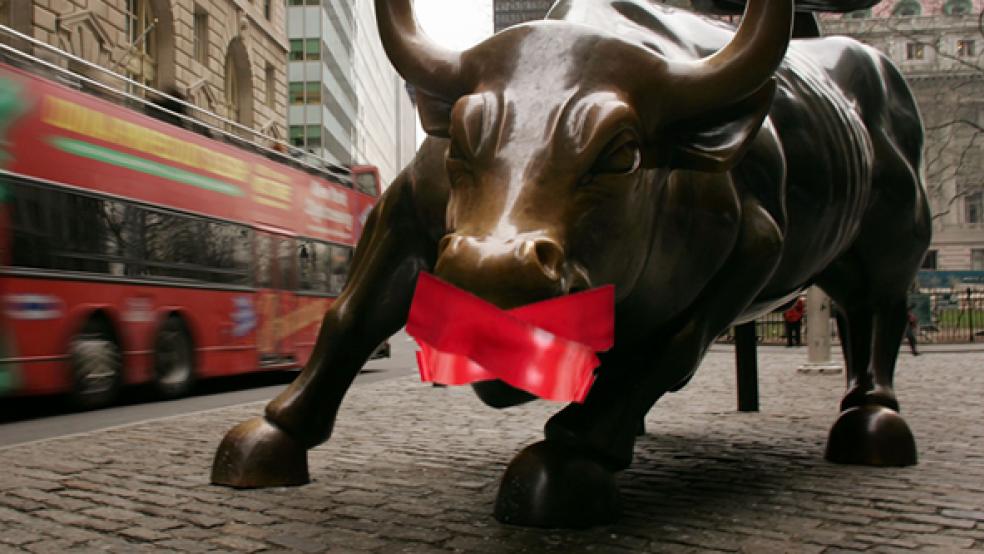Another week, another step closer to financial Armageddon. President Obama spent the weekend trying to impress upon a skeptical public the wild notion that a default on U.S. debt could ruin their summer.
Senators from both sides of the aisle took to the Sunday talk shows, only to paint themselves deeper into their respective corners. And Michele Bachmann expanded her franchise of fractured science, venturing into economics to assure her public that an American government rendered unable to pay its bills is no big deal.
And Wall Street is…okay with this?
True, financial services CEOs such as Citigroup’s Vikram Pandit and BlackRock’s Lawrence Fink were among the 470 corporate Pooh-Bahs who signed a Business Roundtable letter last week urging Washington to avoid default. And many Wall Street trade groups have issued antiseptic statements that say, in effect: “We respectfully urge our elected officials not to visit financial calamity on the world.”
But really, folks, that’s not just no bite--it’s no bark. Compare Wall Street’s oddly passive stance on the debt ceiling with the treasure it has expended fighting regulatory reform. You’d think it was Elizabeth Warren who was threatening to default on $14 trillion and plunge the world into a second global crisis. And then there is the market. As politicians took turns delivering ultimatums and stomping out of meetings (or not), the yield on the benchmark 10-year Treasury bond actually fell slightly to 2.9%. Compare that with the 18% yield on comparable Greek government bonds, another country with a famous debt problem.
There are only two possibilities: Either Wall Street knows something the rest of us don’t, or Wall Street is in denial.
Wall Street Knows Something
Based on the lousy job financiers did anticipating the 2008 financial crisis, we can rule out the idea that the Street actually knows the future. What it does know is what everyone else on the Street is saying about the future. And what they’re saying is that the debt ceiling will be raised.
When asked why the Street isn’t more worried, Brian Salisbury, senior policy analyst for FBR Capital says, “Because for the past six months they’ve been listening to people like me tell them that everything will be okay.”
What makes analysts like Salisbury so sure? Logic, for one thing. “However we got here, and however we're going to get out of it in the long run,” David Kelly of JP Morgan told Barron’s, “the debt is too large to go to zero overnight, and therefore it's simply untenable to say that you are not going to raise the debt ceiling. No serious politician should say that.”
Anyone who understands finance knows that a default would send the U.S. back into recession, which would only widen the deficit. They know it makes no sense to vote to extend the Bush tax cuts in December and thereby accelerate the need to raise the debt ceiling, then seven months later to vote against raising it.
Most of all, Wall Street sees the debt ceiling debate as mere political theater, which, by the way, House Speaker John Boehner has promised will have a happy ending. Because Armageddon can be avoided, and because avoiding it is in everyone’s interest, logic suggests it will be avoided. That frees financial executives and traders to focus on issues that really will affect their profits: earnings season, new regulation, and Greek debt. As Grant’s Interest Rate Observer editor Jim Grant puts it, “The talks in Washington, DC, over the debt ceiling, we regard as political posturing. Not so the [Greek mess]. Now there is a crisis.”
Wall Street Is in Denial
But suppose that logic is not the most relevant attribute here? Boehner may understand the need to avoid financial calamity, but it’s not clear that he controls the GOP’s junior members. For them, there is too much political thrill to be gained by racing still closer to the edge of the cliff before jumping out of the car. Indeed, some 90 of them, according to Salisbury, have declared their willingness to drive over the cliff rather than vote for tax increases.
Some analysts are starting to warn the financial markets that the sanest course isn’t necessarily the one Congress will take. Greg Valliere, chief political strategist at Wall Street consultant Potomac Research, estimates a 35% chance that there will be no deal before August 2. Salisbury puts it at 25%.
In that case, Treasury Secretary Tim Geithner will almost certainly ensure that Treasury bondholders are paid, even if other parts of the government must be selectively shut down. But here’s the rub: The credit rating agencies have made it clear that a shutdown will trigger a downgrade of U.S. debt. You may or may not respect Standard & Poor’s and Moody’s, but many institutions’ investment policies allow them to hold only triple-A-rated securities. It’s not clear what will happen if they can’t hold U.S. bonds. But it’s surely not going help bond prices.
If there is no deal by the end of this week, Valliere predicts, you can expect Wall Street to begin to focus on the issue. Some on the Street ask whether it will take a stock market crash like the 700-point downer that followed Congress’s refusal to pass TARP in 2008 to get Congress to compromise. That’s the last thing the economy (or Wall Street) needs. It’s time for the big dogs to start barking.
[Eric Schurenberg is Financial Editor-at-Large of AARP the Magazine and a commentator on Nightly Business Report.
With reporting by Judy Feldman.
More on the debt-ceiling crisis from The Fiscal Times:
A Radical New Plan to Slash the Deficit by $9 Trillion






